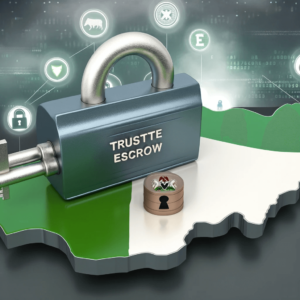In many financial transactions, especially those involving real estate, mergers and acquisitions, and other large-scale transactions, an escrow trustee, also referred to as an escrow agent or escrow company, plays a critical role. An escrow trustee is an impartial third party who is charged with protecting money, papers, or other assets on behalf of parties involved in a transaction until certain requirements are satisfied or duties under contracts are completed.
The escrow trustee guarantees that the transaction runs smoothly in accordance with the prearranged terms and that neither party suffers any disadvantages. In a financial transaction involving an escrow trustee, the following activities take place:
- The two parties agree on the terms and conditions.
- The purchaser pays the amount into the escrow account managed by the escrow trustee.
- The vendor party performs/renders the services.
- the purchaser receives same and is satisfied, and
- The escrow trustee releases the amount in favour of the vendor.
An Escrow Trustee during a transaction or deal is tasked with important rules and regulations. They are, but are not limited to the following:
- Document Verification: Before releasing funds or assets to the rightful owner, escrow trustees have the option to check documents to make sure they adhere to the terms stated in the agreement.
- Preserving Neutrality: To protect the interests of all parties engaged in the transaction, escrow trustees must maintain their objectivity and neutrality throughout.
- Safekeeping of Funds or Assets: An escrow trustee’s main duty is to keep money, papers, or assets in a safe place until the deal’s terms are fulfilled.
- Ensuring Compliance: They make sure that the terms and conditions specified in the escrow agreement are followed by all parties engaged in the transaction.
- Transaction Facilitation: Escrow trustees assist in a range of transactions, such as the buying and selling of real estate, the acquisition of businesses, and the transfer of intellectual property if need be.
- Disbursement of Funds: In accordance with the terms of the agreement, the escrow trustee distributes funds or transfers assets after all requirements are satisfied.
Depending on the parties involved and the nature of the transaction, escrow transactions in Nigeria usually fall into one of many categories. In Nigeria, escrow transactions typically take the following forms:
- Escrow Services for Business Transactions: Escrow services are used in business transactions, including partnerships, mergers, and acquisitions. In this term, funds are kept in escrow until certain clauses or requirements in the contract are fulfilled.
- Real Estate Escrow: Escrow is frequently used in real estate transactions to retain funds until specific requirements are met, like the fulfilment of buyer and seller contractual duties or the transfer of property titles.
- Online Payment Escrow: Online payment escrow services have grown in popularity as Nigeria’s e-commerce industry expands. These services offer a degree of protection to both buyers and sellers by holding customer payments until the items or services are delivered in a satisfactory manner.
Selecting an escrow trustee usually entails considering several crucial aspects that guarantee the trustee’s competence, dependability, and legal compliance. Here are some common factors, though specific criteria may differ based on the situation and the parties involved:
- Legal Authorisation: To function as a trustee in Nigeria, the escrow trustee must hold the necessary legal authorisation. This entails obtaining a registration and license from the appropriate regulatory bodies, i.e., the Securities and Exchange Commission (SEC).
- Experience and Expertise: Trustees with a track record of success and knowledge managing escrow agreements, especially in the Nigerian market, will be given preference. Proficiency in pertinent legal, financial, and regulatory affairs is essential.
- Financial Stability: To properly handle the funds or assets placed in escrow, the trustee must show that they are solvent and have sound financial standing. To ensure financial reliability, this may entail submitting financial statements and going through inspection.
Conclusion of Escrow Trustee
Assuring the security and integrity of diverse financial transactions is a major responsibility of DLM Trust. They serve as impartial and neutral intermediaries, reducing risks and fostering confidence between parties involved in a transaction.
Experience top-notch trustee services from DLM Trust today. Contact us for more information.





